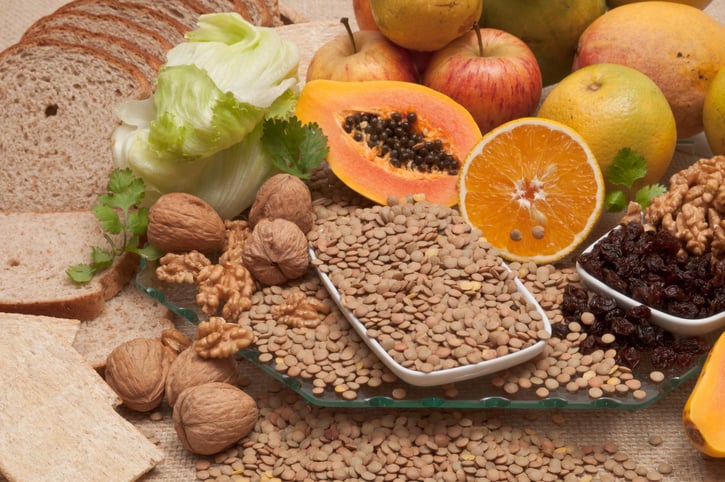5 Reasons You Need More Fiber in Your Diet (see the benefits)

With its versatility and array of health benefits, dietary fiber is what I like to refer to as a nutrition all-star. Yet despite its overall awesomeness, fiber is one of the most overlooked, disregarded nutrients. This is evidenced by the fact that the average person only consumes a paltry 17 grams per day. Only 5% of the population meets the Adequate Intake (AI).1
Simply getting enough fiber daily can have a dramatic impact on your waistline, overall health, and quality of life. I mean, let’s be honest, who doesn’t appreciate a good BM and being regular?
Here are at least five benefits of fiber (no one said I was a math whiz). Don’t worry, I’ll be sure to let you know exactly how much fiber you need per day and where you can find it.
5 Health Benefits of Fiber
Digestive Health
To borrow from Forest Gump’s famous quote, dietary fiber and digestive health go together like peas and carrots. Along those lines, consuming enough fiber is critical for good digestive health. This is defined by the American Gastroenterological Association as “a digestive system that has appropriate nutrient absorption, intestinal motility, immune function, and a balanced microbiota.” Surprisingly for many of us, they continue, “Most people with good digestive health do not regularly experience digestive symptoms such as heartburn, rumbling, nausea, bloating, excessive flatulence, constipation, diarrhea, or abdominal pain or discomfort.”2
Among its digestive health prowess, dietary fiber—particularly insoluble fiber—is well-known for aiding in laxation (there’s the BM talk I referred to) by:1
- Increasing fecal bulk (via the fiber itself, water held by the fiber, and increased bacterial mass)
- Increasing stool frequency
- Reducing intestinal transit time
Additionally, certain types of fiber (such as oligosaccharides, gums, and resistant starches) are fermented by the good bacteria in the large intestine. These fibers, often referred to as “prebiotics,” lead to the production of short-chain fatty acids (SFCA). These are known to fuel the immune system, stimulate the production of appetite-suppressing hormones, have anti-inflammatory properties, support healthy mitochondria, and offer neuroprotective effects.3–5
Heart Health
One of the most forgotten benefits of fiber is how it boosts a healthy heart.
The connection between dietary fiber and heart health is so strong that the Institute of Medicine (IOM) bases its recommendation for how much fiber per day you should eat on it. Indeed, there’s no shortage of evidence that higher fiber intakes reduce the risk of cardiovascular disease and coronary heart disease.7
Several potential mechanisms explain fiber’s cardioprotective role. For instance, studies have shown that higher fiber intakes may:1
- Lower total and LDL cholesterol
- Raise HDL cholesterol
- Lower blood triglycerides
- Lower blood pressure
- Reduce markers of inflammation
Glycemic Control
There’s also a large amount of evidence that shows a strong inverse relationship between dietary fiber consumption and type 2 diabetes.1,8 In other words, one of the best health benefits of fiber is that it can significantly reduce the risk of diabetes.
On one hand, fiber may help improve glycemic control by slowing gastric emptying rates, digestion, and absorption of glucose. In other words, when fiber is consumed as part of a carbohydrate-containing meal, it helps lower the glycemic response (i.e., the after-meal rise in blood sugar).
Also, certain types of fiber (e.g., prebiotics) may improve insulin sensitivity. Of course, fiber-rich foods also contain other beneficial nutrients and antioxidants, which may help improve metabolic health and function. And as you’ll see, fiber may indirectly improve glycemic control and insulin sensitivity by improving weight-loss outcomes.
Supercharge Your Diet Results with IC-5
IC-5, which is scientifically-designed to promote insulin sensitivity and improved carb tolerance, is one of our top diet-boosting supplement.
With IC-5, you know that you are supporting carbohydrate tolerance, keeping potentially harmful AGEs at bay, and amplifying the anti-aging effects of the ketogenic diet. It’s a triple threat for overall health and anti-aging!
Overall Health and Longevity
What’s the opposite of longevity and healthy aging? Death. Sounds pretty grim, I know, but along these lines, multiple studies have suggested that dietary fiber may have a protective effect on all-cause mortality, which is just a fancy way of saying death from all causes.
For example, in the Nurses’ Health Study, which had over 50,000 participants, researchers found an inverse association between fiber intake and all-cause mortality.9 What’s more, the National Institutes of Health-AARP Diet and Health Study, a large prospective cohort study, revealed that dietary fiber intake is inversely associated with total death rates, specifically cardiovascular, infectious, and respiratory deaths in both men and women, as well as cancer deaths in men.10 Speaking of which, dietary fiber is known to protect against various forms of cancer, including colon, breast, and gastric cancers.1
Weight Management
There is strong evidence from observational studies that obesity prevention is one of the amazing benefits of fiber. And, diets higher in fiber promote a healthy body weight and prevent weight gain. While there are multiple explanations for this, many attribute fiber’s beneficial effects on weight management to increased satiety, decreased hunger, and subsequently, reduced caloric intake, although studies looking at isolated fibers often don’t support these mechanisms.1,11–13
Practically speaking, when you start to eat more fiber-rich foods—like fruits, vegetables, whole grains, legumes, nuts, and seeds—a couple of things happen. For starters, you tend to displace less healthy, more energy-dense foods with healthier, lower-calorie foods that have more weight and volume. Along these lines, the amount of food you eat may be one of the most important factors making you feel full and cueing you to stop eating.14
How Much Fiber Do You Need a Day?
Surely, by now you have to be wondering how many grams of fiber per day you need to reap the benefits of fiber. Generally speaking, a good target is 30 – 40 grams of fiber per day.
More specifically, the AI, which is established by the IOM based on the median fiber intake level observed to achieve the lowest risk of coronary heart disease, is 14 grams of fiber per 1,000 calories consumed. More precisely, the IOM recommends 25 grams per day for adult women and 38 grams per day for adult men.15
What are the Best Sources of Fiber?
Speaking generally, fruits, vegetables, legumes, whole grains, nuts, and seeds are the best dietary sources of fiber. Having said that, while dietary fiber has traditionally been categorized as soluble and insoluble, we now know there are additional characteristics (e.g., viscosity, fermentability) that help determine the effects different fibers will have in the body. Along those lines, because different plant foods contain unique fibers, it’s a great idea to consume a variety of foods from the categories mentioned above to meet your daily fiber goal.







